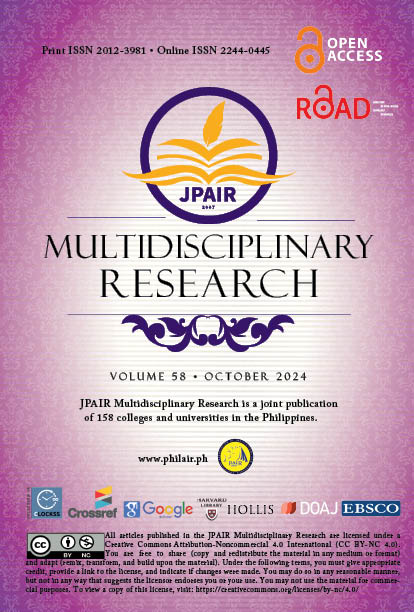A Student-Centric Analysis of Faculty Competences and Competencies for Effective Educational Experiences
DOI:
https://doi.org/10.7719/jpair.v58i1.911Keywords:
Student-Centric Analysis, Educational Experiences, Descriptive Quantitative Design, Cavite City, PhilippinesAbstract
Competences represents different characteristics of a holistic approach to personal development and community engagement and Competencies are aspects that plays a crucial role in effective teaching and contributes to creating meaningful learning experiences for students. The objectives of the study are to determine the competences and competencies that provides effective teaching at San Sebastian College – Recoletos de Cavite Inc., to analyze the faculty performance based on student perspectives using the Student Evaluation of Teachers tool, and to develop recommendations for improving faculty competences and competencies from a student-centric perspective. The study used a descriptive quantitative design and evaluation results from the Center of Research and Creative Works of San Sebastian College – Recoletos de Cavite, Inc. are gathered to analyze the data. The evaluation of faculty competencies across three academic years (2020-2021, 2021-2022, and 2022-2023) reveals consistent high performance. In 2020-2021, the majority of faculty received high-level ratings in both competences and competencies, with 146 and 148 faculty members respectively. This trend continued in 2021-2022, with a significant increase to 352 and 356 faculty members receiving high-level ratings. The 2022-2023 data shows a slight decrease, with 183 and 186 faculty members rated at a high level. Across all years, very few faculty members were rated at low or very low levels, indicating overall strong faculty performance. Continuous curriculum adaptation, incorporating online teaching methods, and improving collaboration with the industry while supporting effective work-life routines will help educational institutions to improve their academic performance.
Downloads
References
Adlawan, A. A., Mabandes, L. L., Fadare, A. S., Gumanoy, A. D., Oyda, A. A., Malinis, A. B., & Pagdato, J. V. (2024). Faculty Performance Appraisal by Students: A Basis for Supervisory Plan Model. Tuijin Jishu/Journal of Propulsion Technology, 45(1), 3574-3581.
Asfahani, A., El-Farra, S. A., & Iqbal, K. (2023). International Benchmarking of Teacher Training Programs: Lessons Learned from Diverse Education Systems. EDUJAVARE: International Journal of Educational Research, 1(2), 141-152.
Baker, C. (2017). Quantitative research designs: Experimental, quasi-experimental, and descriptive. Evidence-based practice: An integrative approach to research, administration, and practice, 2, 155-183.
Downloads
Published
Issue
Section
License
Copyright (c) 2024 Paolo Roberto O. Lozada

This work is licensed under a Creative Commons Attribution-NonCommercial 4.0 International License.
Open Access. This article published by JPAIR Multidisciplinary Research is licensed under a Creative Commons Attribution-Noncommercial 4.0 International (CC BY-NC 4.0). You are free to share (copy and redistribute the material in any medium or format) and adapt (remix, transform, and build upon the material). Under the following terms, you must give appropriate credit, provide a link to the license, and indicate if changes were made. You may do so in any reasonable manner, but not in any way that suggests the licensor endorses you or your use. You may not use the material for commercial purposes.





















